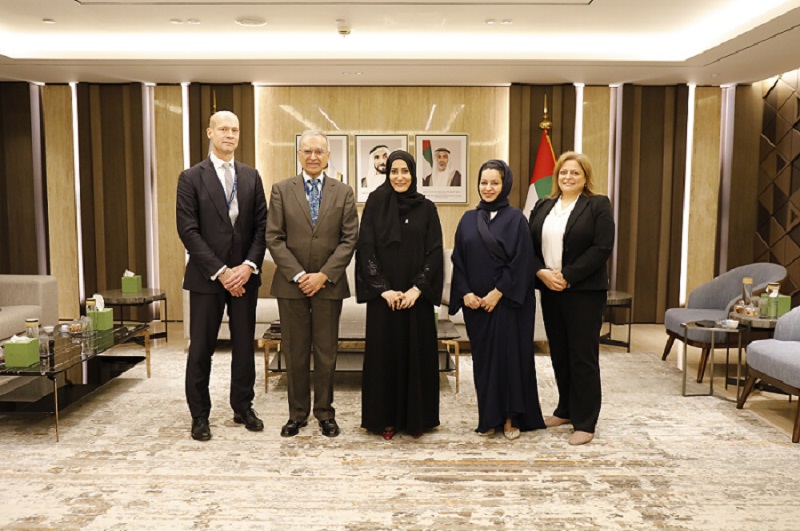
Abu Dhabi, UAE – 26th November 2024 – As global markets continue shifting towards sustainability and decarbonisation, the UAE continues its regional leadership role in the impact economy. In response to this evolving landscape, the Abu Dhabi Sustainability Group (ADSG) with the support of the Environment Agency – Abu Dhabi (EAD), hosted a high-level roundtable entitled “The Road to the Impact Economy and its Effect on Financial Markets Risks and Opportunities for the UAE."
The event, held in Abu Dhabi, gathered local and global experts to examine how sustainability imperatives were reshaping the financial sector, particularly in emerging markets like the UAE. Organised in partnership with Sustainability to Action and GIST Impact, this exclusive two-hour session explored how transitioning to an impact-driven economy affects monetary policies, market regulations, and investment strategies.
The impact economy refers to an economic system where companies, investors, and other stakeholders actively prioritise measurable positive social and environmental outcomes alongside financial returns. In an impact economy, business success is not solely determined by profits but by how well an organisation contributes to societal good, from addressing climate change to promoting equality. It represents a shift from traditional profit-centric models to those that align business practices with global sustainability goals, such as those outlined in the UN Sustainable Development Goals (SDGs).
H.E. Dr. Shaikha Salem Al Dhaheri, Secretary General of the Environment Agency – Abu Dhabi (EAD), said about the event: “The Roundtable reaffirms the Environment Agency- Abu Dhabi’s forward-looking vision in addressing the topic of financial markets. As a signatory of the Sustainable Finance Declaration, we are committed to enabling this process through raising awareness, encouraging education, and developing policies and regulations to foster green and sustainable investments in the Emirate of Abu Dhabi, the UAE and the GCC”.
The Roundtable was held to discuss emerging trends; the transition towards an impact economy is reshaping expectations from businesses and financial institutions globally. The ADSG, recognising this shift, aims to explore how businesses in the UAE and the broader MENA region can lead in integrating social and environmental impact into core economic strategies. The event helped bring key stakeholders together from finance, business, and sustainability to explore new pathways for sustainable growth. By convening these stakeholders, the roundtable served as a platform to build a collaborative ecosystem in the UAE that supports the impact economy.
The roundtable was facilitated by Armin Peter, a leading figure in sustainable finance and capital markets with over 25 years of experience. Armin recently served as Managing Director and Global Head of Debt Syndicate and Sustainable Banking for EMEA at UBS Investment Bank. His role in developing the UBS Green Bond Funding Framework and leading the HKMA multi-currency digital green bond transaction highlighted his contribution to the industry's shift towards decarbonization and digitalization. His expertise in global debt issuance across developed and emerging markets provided valuable insights during the discussions.
Reflecting on the event, Armin Peter said: "The discussions during this roundtable offered critical insights into how financial markets are adapting to sustainability-driven changes. It was fascinating to explore the interplay between shifting monetary policies, sustainability imperatives, and investment strategies. The UAE’s leadership in this area is truly commendable, and we saw how collaboration across sectors can accelerate the transition to a more impact-focused economy."
The key topics addressed included: the impact of changes in monetary policy and geopolitical dynamics, the need for business transformation and leadership, the transition finance landscape, and the rise of the impact economy and its implications for the future of capital markets globally–with a particular focus on emerging markets.
The event was organised to help increase collaboration; as a key outcome of the roundtable is a commitment to stronger cross-sector collaboration, as partnerships across finance, business, and sustainability are essential for driving impactful change. In addition to discussions aimed at raising awareness and promoting thought leadership in the UAE and beyond, encouraging organizations to adopt and champion sustainable, impact-focused practices.
Pavan Sukhdev, a globally recognised environmental economist and founder of GIST Impact, was a key participant and co-facilitator at the event. With his extensive background in sustainability and finance, including his leadership of the G8+5 TEEB (The Economics of Ecosystems and Biodiversity) study, Sukhdev provided unique perspectives on how integrating environmental sustainability with financial performance can benefit global capital markets.
Huda Al Houqani, Director of ADSG, also reflected on the significance of the event, stating: "Bringing different stakeholders to the table is essential for accelerating progress towards sustainability. Events like this create a platform for dialogue, enabling partnerships and collaboration that are key to addressing the complex challenges we face. The UAE's commitment to sustainability is clear, and by working together, we can support transformative changes across the financial markets and beyond."
Sandra Anani, Director of Sustainability to Action, the UAE regional hub for the Capitals Coalition and one of the event’s organizers, remarked on the significance of this gathering: "Creating an impact economy is about transforming how we view success – blending financial returns with positive social and environmental impact. This roundtable was a powerful step in mobilising UAE businesses and financial leaders to work together towards a sustainable future."
The event concluded with a strong commitment to continue fostering collaboration and knowledge-sharing among stakeholders, setting the stage for further advancements in sustainability and impact-driven economic practices.
